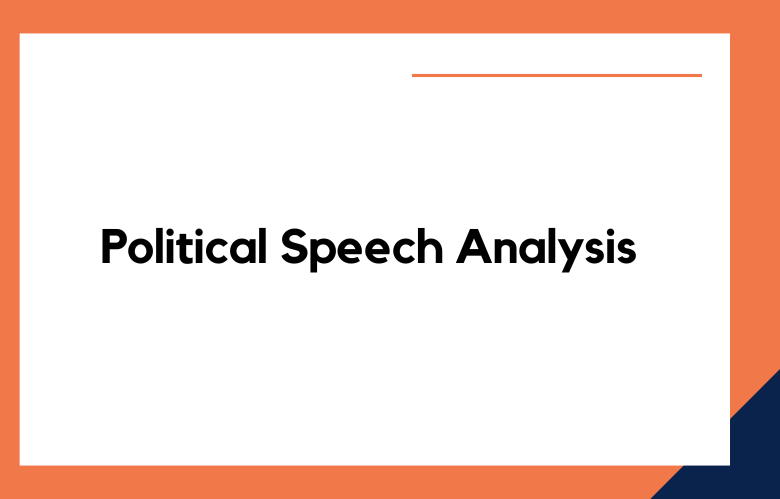As AI technologies continue developing, they are increasingly applied to politics. One area where AI is used is in speech analysis, where researchers explore ways to use artificial intelligence to better understand political speeches and their messages.
One technology explored is generative AI, which uses machine learning algorithms to create new text based on patterns and data. We will examine the potential for generative AI for speech analysis in politics, the benefits and challenges of its implementation, and the implications of these developments for the future of political speech analysis.
From Words to Algorithms: How Generative AI is Revolutionizing Political Speech Analysis
Generative AI is a powerful tool that revolutionizes the analysis of political speeches. By processing vast amounts of data quickly and accurately, generative AI algorithms are helping researchers gain deeper insights into political discourse and the strategies politicians use to influence public opinion.
One way in which generative AI is being used in political speech analysis is through the creation of natural language models. These models can be trained on vast amounts of text from political speeches, debates, and public statements, allowing the algorithm to learn patterns and trends in language use. This can reveal insights into the rhetoric of politicians, including common themes, phrases, and rhetorical devices.
Unmasking Politicians: The Role of Generative AI in Analyzing Political Speeches
As the world becomes increasingly interconnected through technology and social media, there is a growing need to analyze politicians’ language to uncover their true intentions and beliefs. In this context, the role of generative AI in unmasking politicians has gained significant attention.
Generative AI, a branch of artificial intelligence that focuses on creating new content, can analyze political speeches and identify patterns that may reveal hidden meanings or deceptions. Using natural language processing and machine learning algorithms, generative AI can identify critical phrases, tone of voice, and other linguistic patterns that may indicate a politician’s real intentions.
Generative AI in analyzing political speeches offers numerous benefits, including enhanced accuracy and speed. The technology can provide a more objective analysis of political language, removing human biases and personal interpretations from the equation.
AI-Powered Insights: How Generative AI Transforms Political Speech Analysis
Artificial Intelligence (AI) has been making headlines recently due to its transformative impact on various industries. In political speech analysis, generative AI has emerged as a groundbreaking technology, promising to revolutionize how political speeches are analyzed and understood.
Generative AI is a type of AI technology that uses machine learning algorithms to generate new content based on existing data. In the context of political speech analysis, generative AI can analyze large volumes of political speeches and language patterns and create insights and understandings that would be difficult or impossible for humans to discern on their own.
One critical benefit of generative AI in political speech analysis is its ability to provide more nuanced insights into political discourse. This technology can identify subtle differences in language use, such as lexical and syntactic patterns, that indicate particular political viewpoints, intentions, or strategies.
By analyzing large amounts of speech data, generative AI can comprehensively understand the political landscape, highlighting trends and patterns that would otherwise remain invisible to human analysts.
Democratizing Political Speech Analysis with Generative AI
In the past, political speech analysis has been a tool used primarily by politicians, journalists, and political analysts to gain insights into the political rhetoric of campaigning candidates. How
The rise of generative artificial intelligence (AI) technology has created an opportunity to democratize political speech analysis. By applying AI to political speech analysis, the potential exists to broaden accessibility to this powerful tool for the general public.
Generative AI technology enables the creation of text that mimics human speech. This technology can be applied to political speech analysis by inputting an address or transcript into a trained generative AI model, which can then analyze and extract meaning from the text. This could revolutionize the political landscape by allowing a broader spectrum of people to gain insights into political rhetoric.
The AI Analyzer: How Generative AI Enhances Political Speech Evaluation
Artificial intelligence (AI) in politics has reached new heights, and the application of generative AI in analyzing political speeches is a testament to this. The AI analyzer, a cutting-edge tool that evaluates political speeches, has demonstrated its ability to enhance the evaluation process with its advanced natural language processing (NLP) algorithms.
Generative AI, a subset of AI, allows machines to generate new content based on existing data. When applied to politics, this technology can analyze historical political speeches and create new ones that appeal to a target audience. The AI analyzer uses generative AI to dissect political speeches and helps identify persuasive techniques and rhetorical strategies politicians use to sway public opinion.
With the rise of social media and the 24-hour news cycle, the role of political speeches in shaping public opinion has become increasingly important. The AI analyzer offers a unique perspective on political speeches to comprehensively analyze the underlying message, tone, and structure.
The Future of Political Rhetoric: Navigating Generative AI in Speech Analysis
UGenerative AI and Speech Analysis
Generative Artificial Intelligence (AI) is an emerging technology that has the potential to revolutionize the way we analyze political rhetoric. Generative AI uses natural language processing algorithms to generate text based on a given input, allowing it to quickly and accurately analyze speech data in real time.
This technology can be used to identify patterns in political discourse, detect trends in public opinion, and even predict future election outcomes.
Advantages of Generative AI for Political Rhetoric
Generative AI provides numerous advantages when it comes to analyzing political rhetoric. It can provide insights into how politicians frame their messages, which words they use most often, and which topics resonate with voters.
Generative AI can help identify potential areas of disagreement between candidates or parties that could be used as leverage in negotiations or debates.
Challenges of Generative AI for Political Rhetoric
While generative AI offers many advantages for speech analysis, some challenges are associated with its use. For example, the accuracy of generative AI depends on the quality of the data being analyzed; if the data is incomplete or biased, the results may not be accurate or reliable. Generative AI is still relatively new and may not have been tested thoroughly enough to ensure accuracy in all situations.
Impact on Political Campaigns
Generative AI has the potential to significantly impact political campaigns by providing detailed insights into voter sentiment and candidate messaging strategies. By using this technology, campaigns can better understand what issues are important to voters and how best to frame their messages accordingly to maximize their chances of success at the ballot box.
Impact on Political Discourse
Generative AI could also impact political discourse by providing more objective measures for evaluating candidates’ performances during debates or other forums where they must articulate their views on various topics in front of large audiences.
By using this technology, moderators could better understand how well each candidate performed relative to one another and whether any particular arguments were more persuasive than others among viewers watching at home or in person.
Potential Limitations
Despite its potential benefits for political rhetoric analysis, some limitations associated with generative AI should be considered before implementing it widely within this context. For example, there is currently no way for this technology to capture the nuances of human communication completely;
While it may detect specific patterns or trends in speech data sets, it will never fully replicate a human’s ability to interpret complex conversations from multiple perspectives in real time simultaneously. There is always a risk that biased algorithms could skew results if not adequately monitored by trained professionals who understand the strengths and weaknesses of this type of technology.
Ethical Considerations
In addition to technical considerations, ethical concerns must be considered when utilizing generative AI for speech analysis. While this technology has tremendous potential, it must be used responsibly to not infringe upon individuals ‘ rights, such as freedom of expression.
Therefore, any system utilizing generative AI for speech analysis must include safeguards that ensure privacy, accuracy, transparency, fairness, and accountability.
Ethical Considerations
In addition to technical considerations, ethical concerns must be considered when utilizing generative AI for speech analysis. While this technology has tremendous potential, it must be used responsibly to not infringe upon individuals ‘ rights, such as freedom of expression. Therefore, any system utilizing generative AI for speech analysis must include safeguards that ensure privacy, accuracy, transparency, fairness, and accountability.
Conclusion
Generative AI is a powerful tool for speech analysis in politics. It allows campaigners to gain valuable insights into public opinion, track changing trends, and predict future outcomes. However, this technology also has potential challenges and drawbacks, including the potential for bias and the impact on democracy itself.
As AI continues to play an increasingly important role in politics, it’s essential to be aware of these issues and to work towards ensuring that the technology is used ethically and responsibly. By doing so, we can help to ensure that democracy remains strong and vibrant in the years to come.











